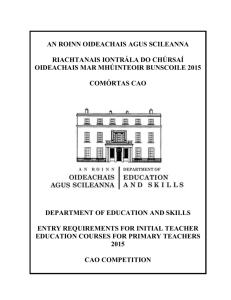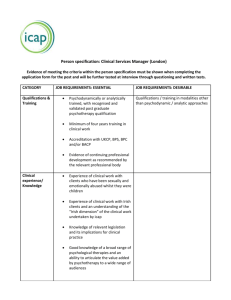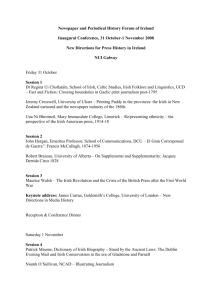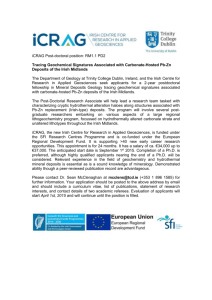Graduate Diploma in Education (Primary Teaching)
advertisement
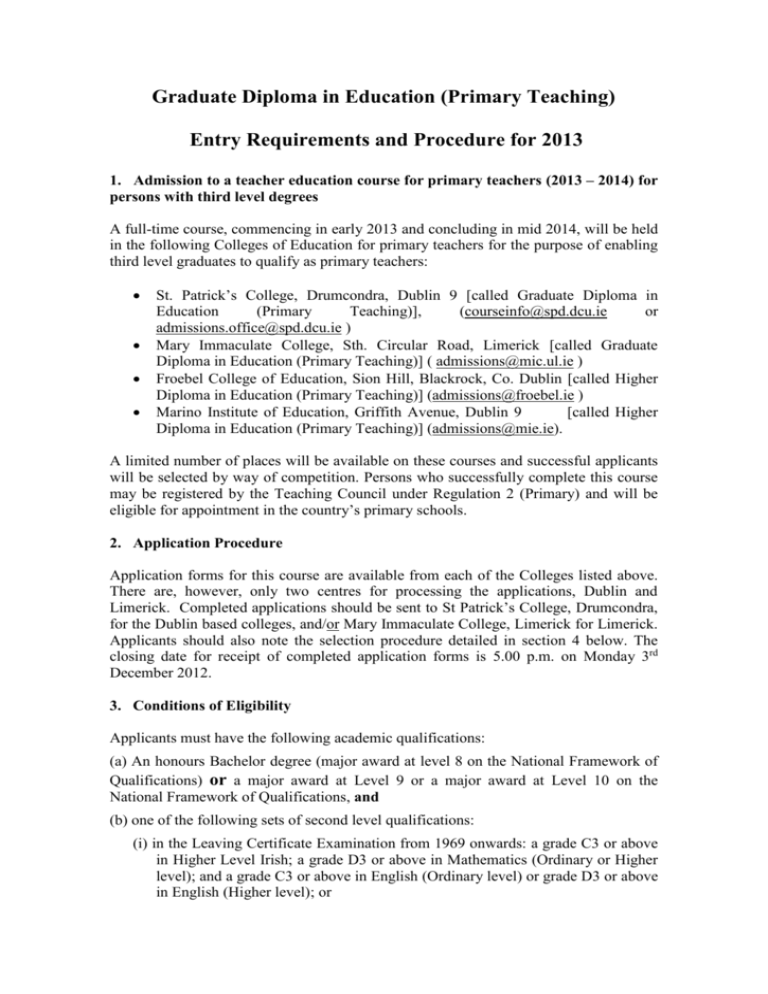
Graduate Diploma in Education (Primary Teaching) Entry Requirements and Procedure for 2013 1. Admission to a teacher education course for primary teachers (2013 – 2014) for persons with third level degrees A full-time course, commencing in early 2013 and concluding in mid 2014, will be held in the following Colleges of Education for primary teachers for the purpose of enabling third level graduates to qualify as primary teachers: St. Patrick’s College, Drumcondra, Dublin 9 [called Graduate Diploma in Education (Primary Teaching)], (courseinfo@spd.dcu.ie or admissions.office@spd.dcu.ie ) Mary Immaculate College, Sth. Circular Road, Limerick [called Graduate Diploma in Education (Primary Teaching)] ( admissions@mic.ul.ie ) Froebel College of Education, Sion Hill, Blackrock, Co. Dublin [called Higher Diploma in Education (Primary Teaching)] (admissions@froebel.ie ) Marino Institute of Education, Griffith Avenue, Dublin 9 [called Higher Diploma in Education (Primary Teaching)] (admissions@mie.ie). A limited number of places will be available on these courses and successful applicants will be selected by way of competition. Persons who successfully complete this course may be registered by the Teaching Council under Regulation 2 (Primary) and will be eligible for appointment in the country’s primary schools. 2. Application Procedure Application forms for this course are available from each of the Colleges listed above. There are, however, only two centres for processing the applications, Dublin and Limerick. Completed applications should be sent to St Patrick’s College, Drumcondra, for the Dublin based colleges, and/or Mary Immaculate College, Limerick for Limerick. Applicants should also note the selection procedure detailed in section 4 below. The closing date for receipt of completed application forms is 5.00 p.m. on Monday 3rd December 2012. 3. Conditions of Eligibility Applicants must have the following academic qualifications: (a) An honours Bachelor degree (major award at level 8 on the National Framework of Qualifications) or a major award at Level 9 or a major award at Level 10 on the National Framework of Qualifications, and (b) one of the following sets of second level qualifications: (i) in the Leaving Certificate Examination from 1969 onwards: a grade C3 or above in Higher Level Irish; a grade D3 or above in Mathematics (Ordinary or Higher level); and a grade C3 or above in English (Ordinary level) or grade D3 or above in English (Higher level); or (ii) in the Leaving Certificate Examination prior to 1969, Honours in Irish and passes in English and Mathematics; or (iii) in the Northern Ireland GCSE and GCE A Level Examinations: a Grade C at GCE A Level Irish; a Grade C at GCSE Level in both English and English Literature or Grade B at GCSE Level in either; and a Grade D at GCSE Level in Additional Mathematics or a Grade C at GCSE Level in Mathematics. Applicants must provide evidence to the Colleges of Education that their honours Bachelor degree is placed as a major award at level 8 on the National Framework of Qualifications. Holders of a major award at Level 9 or a major award at Level 10 must also provide evidence of their award’s position on the NFQ. Applicants must meet all entry requirements at the time of application and provide documentary evidence of meeting these requirements. Alternatives to second level qualifications in Irish, English or Maths A Pass in a University First Arts Examination in Irish, English or Mathematics will be accepted in lieu of the Leaving Certificate Examination/GCE/GCSE requirement for the relevant subject. In the case of Irish, a Grade C in the Matriculation Examination (which existed up to 1992) will also be accepted in lieu of the Leaving Certificate Examination/GCE/GCSE requirement. In addition, the following are accepted as satisfying the Leaving Certificate Examination/GCE/GCSE requirement: Dioplóma sa Ghaeilge, Level C1, NUIG Dioplóma sa Ghaeilge, Level B2, NUIG Dioplóma sa Ghaeilge, NUI Maynooth Teastas Eorpach na Gaeilge (TEG) at Level B2, NUI Maynooth Diploma in Arts (Applied Irish), University College Cork Dioplóma sa Ghaeilge Fheidhmeach,UCD Dioplóma sa Ghaeilge (An Ghaeilge sa Saol Comhaimseartha), University of Limerick Diploma in Irish at the University of Ulster In the case of Mathematics, a Pass in that subject in the Matriculation Examination will also be accepted in lieu of the Leaving Certificate Examination/GCSE requirement. 4. Selection Procedure Eligible applicants will be required to undergo an Interview and an Oral Irish test. The results of these tests will be graded and allocated points as follows: Interview A AB B- 100 90 80 70 Oral Irish A B C D 40 32 24 16 C CD E 60 50 40 Fail E - Fail Applicants who get a "fail" grade in either the Interview or oral Irish test will be eliminated from the competition. Qualified applicants will be placed in order of merit as determined by the results of the Interview and Oral Irish test. Where two or more applicants obtain the same points total, their placement on the order of merit will be determined by random selection. There will be two separate orders of merit lists: one common list for all of the Dublin Colleges and a separate list for Mary Immaculate College, Limerick. Each College will fill its places by reference to the relevant order of merit and the College preferences of successful applicants. The purpose of the Interview is to ascertain the suitability of the applicant for participation in a primary teacher education course. Part of the Interview may be conducted through Irish. The Oral Irish test will comprise: conversation on everyday topics and on books read by the applicant; and reading correctly and intelligently a suitable passage of prose or poetry and explaining the matter read. Applicants should note that a high standard of fluency is required in the Oral Irish test and should prepare for the test accordingly. Applicants will be advised by the relevant Centre (Dublin and/or Limerick) of the date, time, venue, etc, of their Interview and Oral Irish test and must attend these tests at their own expense. The location will be either Dublin and/or Limerick. 5. General Information Student grants: Following the changes introduced in Budget 2012 new students entering postgraduate courses, from the 2012/13 academic year onwards, will not be entitled to maintenance payments under the Student Grant Scheme. Students entering postgraduates courses who meet the qualifying conditions for the special rate of grant will be eligible to have their post graduate tuition fees paid up to the maximum fee limit of €6,270 under the Student Grant Scheme. A further limited number of students who would previously have qualified under the standard grant thresholds will qualify to have a €2,000 contribution made towards the costs of their fees. The new income threshold for this payment is €31,500 for the 2012/13 academic year, increasing relative to the number of family dependents. Students are advised to submit a fully completed online grant application to SUSI via studentfinance.ie to have their eligibility for grant assistance assessed. Further information on the student grant scheme is available on the studentfinance.ie website Fitness to Practice: 1. Garda Vetting: Before a College can complete a student registration, all incoming teacher education students are required to undergo a process of Garda vetting in order to establish whether they have any convictions or criminal charges pending. Where this process confirms the existence of such, the matter is referred to a Garda Vetting Committee within the College which decides whether the student can continue with his/her programme of study. 2. Medical Requirements: All incoming teacher education students are required to complete a medical information form, indicating whether they have any significant ongoing illnesses or disabilities which might adversely impact their capacity to meet the requirements of the course, including School Placement. Entrants who declare health conditions, disabilities or psychological conditions will be assessed on an individual basis to evaluate whether, with reasonable accommodation(s), they would have the ability to undertake the demands of the programme. Individuals will not be excluded on the grounds that they possess a particular condition or disability if it is deemed likely that it would be possible for that person to fulfil the requirements of the course with reasonable accommodation(s). The Colleges will advise students as to the procedure to be followed in this regard. Proficiency in Irish language: Gaeltacht Placement – Attendance and Cost: All students in Colleges of Education are required to attend a residential placement in the Gaeltacht. It should be noted that this is a compulsory part of the course. The cost of this compulsory placement will not be met by the Department of Education & Skills. During this full-time teacher education course, participants may not engage in business or in any other course of study without the prior permission of the College President. Further information regarding the course is available from the applicant’s College of choice. November 2012
